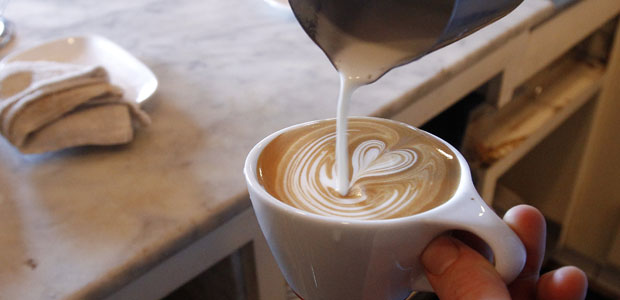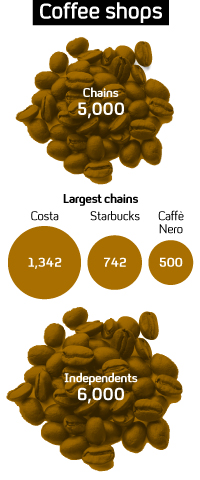Wake up and smell the rise of the coffee shop in Britain
With Starbucks and Costa expanding in the UK, Channel 4 News looks at how coffee shop chains have survived the economic downturn.

Starbucks means business. After announcing 300 new outlets in the UK, it has developed a coffee specifically for the British market. Nothing radical: simply the nation’s favourite coffee (latte), with more espresso and “a new approach to steaming milk”, giving it “smoother taste”, but crucially “at no extra cost to customers”.
That will be a relief to Starbucks customers: at £2.15, the favoured latte does not come cheap.
Starbucks has 742 shops in the UK, way behind Costa’s 1,342. Costa first opened in 1973, while Starbucks did not appear on the British high street until it took over the Seattle Coffee Company’s 50 stores in 1998.
‘Drive-thrus’
200 of the 300 new Starbucks will be, in American English, “drive-thrus”. They will not be in town centres, but will occupy garage forecourts on motorways. Half of these “drive-thrus” will be operated under licence by petrol forecourt retailer Euro Garages, with many outlets opening in the Midlands and the north of England.
There will also be 100 conventional stores in high streets, shopping centres and retail parks. Starbucks says this growth reflects people’s desire for better-quality coffee “wherever they are”.
Five thousands new jobs will be created. Currently, the average Starbucks employee is aged 24 and works 30 hours a week.
During the downturn, the company’s expansion shows confidence in the future. It says is is taking advantage of falling rents and wants to be “ahead of the curve”.
The opposition
Starbucks has coped relatively well during the downturn, with sales rising. It is not the only chain that is expanding. Costa opened 130 outlets in 2011, while third-placed Caffe Nero has been adding another 40 a year in recent times.
While other sectors of the economy have been contracting, this has been one of the biggest growth stories. Jeffrey Young, Allegra Strategies
It is a sign that the coffee shop chain is thriving, according to Jeffrey Young, managing director of independent research consultancy, Allegra Strategies.
Mr Young told Channel 4 News: “This has continued unabated during the recession-era period. While other sectors of the economy have been contracting, this has been one of the biggest growth stories.
“They have traded extremely well during the recession. They’re a very relevant offer for today’s consumer; casual, not expensive, lifestyle-driven. You are spending a few minutes of your life there. You’re able to have lunch there or a business meeting.”
In tough economic times, having a coffee was a treat. “If you’re at a shopping centre, you might not buy a new dress, but you might buy a coffee.”

The rise of the chains worries many people, who fear for the independent shops on their local high streets. While the chains have 5,000 shops in the UK, there are 6,000 independents.
Channel 4 News asked people for their views via Facebook and Twitter – and reactions were mixed.
Christopher Calvert said: “Before Starbucks and Costas – there were very few indie cafes. Britain was a country full of greasy spoons and not much more. Surely chain coffee shops have nurtured a taste for coffee – and have allowed indie shops to flourish.”
Bryan Donnelly said: “I prefer to use independents where I can but only if the coffee warrants it. Too many are just rubbish. If Costa or Nero do better coffee than the independent then that’s where I’ll buy it.”
Matt certainly did not agree. “Coffee chains suck money out of areas to corporate hq. Independents tend to keep more money in local economy,” he wrote. Jamie Keddie said: “Hackney is largely free of large chain coffee shops and the better for it. Lots of small local businesses keep profits local.”
The last word goes to Julia Brown, who said: “I recommend that you come to the east coast … In Bridlington both Burger King and McDonalds closed down, but independent cafes are thriving, few chains there.”
‘Room for growth’
Jeffrey Young believes the independent sector and chains, with a combined turnover of £5bn a year in the UK, can co-exist. “There’s still plenty of room for growth for branded chains,” he said. “The quality independent market is also growing. It will eat into the low-quality, greasy-spoon places.”
Mr Young said the “incredibly social phenomenon” of coffee shops had a bright future. “It’s kind of a pub for teenagers.The younger generation started with this as being normal. It’s second nature to them.”
Age gap
There is an age gap in coffee drinking, according to the pollsters YouGov. The over-55s are more likely to drink instant coffee than 18 to 24-year-olds, who prefer cappuccino and latte.
YouGov also found that people in London were more likely to drink freshly-brewed coffee for breaskfast than anywhere else in Britain, with those in Northern Ireland the least likely.
The poll shows that tea is seen as synonymous with Britishness. But while Mr Young believes it would be a “close call” if the relative popularity of tea and coffee were polled, he is adamant that when people visit coffee shops, “coffee is the rule”.